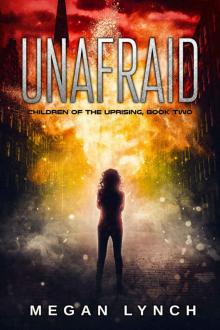- Home
- Megan Lynch
Unafraid (Children of the Uprising Book 2)
Unafraid (Children of the Uprising Book 2) Read online
Unafraid
Megan Lynch
UNAFRAID
By
Megan Lynch
Copyright © 2018 Megan Lynch
Edited by Amanda Roberts.
Cover Design by Olivia at Mibl Art.
All stock photos licensed appropriately.
Published in the United States by City Owl Press.
www.cityowlpress.com
For information on subsidiary rights, please contact the publisher at [email protected]
This book is a work of fiction. Names, characters, places, and incidents either are products of the author’s imagination or are used fictitiously. Any resemblance to actual events or locales or persons, living or dead, is entirely coincidental and not intended by the author.
Except as permitted under the U.S. Copyright Act of 1976, no part of this publication may be reproduced, distributed, or transmitted in any form or by any means, or stored in a database or retrieval system, without the prior consent and permission of the publisher.
To my grandmother, Gay Fields,
who teaches love by her love.
Author’s Note
Don’t miss the start of the Children of the Uprising with book one: UNDONE.
When Their Home is in Danger,
Will The Plan be Undone?
The liberation of their homeland depends on Bristol, Samara, Denver, and Jude. Each has a unique role to play, but the same mission. Yet, when the first phase of their plan is botched, the political climate of their new country turns on the little assembly of American refugees and forces them back into the shadows.
Now, in a race against the clock, they must come together to save those they love back home and find their place in a new world. Will they be able to save their homes, their freedom, and their lives?
Suspenseful, romantic, and awash in the spirit of social justice, the conclusion to the Children of the Uprising series has arrived.
BUY NOW!
Contents
Chapter 1
Chapter 2
Chapter 3
Chapter 4
Chapter 5
Chapter 6
Chapter 7
Chapter 8
Chapter 9
Chapter 10
Chapter 11
Chapter 12
Chapter 13
Chapter 14
Chapter 15
Chapter 16
Chapter 17
Chapter 18
Chapter 19
Chapter 20
Chapter 21
Chapter 22
Chapter 23
Chapter 24
Chapter 25
Chapter 26
Chapter 27
Chapter 28
Chapter 29
Chapter 30
Chapter 31
Chapter 32
Chapter 33
UNDONE SNEAK PEEK
Afterword
Acknowledgments
About the Author
About the Publisher
Additional Titles
Chapter One
Denver Ray hugged herself against the harsh January wind. Even with her head down, it lashed at her face and forced tears from her eyes. But after a long shift of cooking for two hundred people inside the dining room of the monastery, it wasn’t unwelcome.
It was a good place—and they’d been here for the past six months—but it never resembled any sort of home, either. Much too cold. When they’d stumbled upon the evening singing, Bristol, Samara, Jude, Denver, and Stephen could hardly believe it. The mostly-torched sign at the end of the dirt road read St Mary of the— but what exactly she was the saint of was cut off, the edges of the wood singed by a long-ago fire. Bristol joked that it was St. Mary of the Hopeless and Defeated, but Stephen said that couldn’t be right—after all, they were still alive.
Inside, hundreds of people were hiding from the relocation, in just the same situation they were in themselves. None of the incumbent members seemed surprised to see the new little family band of outlaws. Denver and the others were shown around and drilled in the rules of the monastery. They were told they would be moving on to Canada soon, but they would be traveling all together. Once you were here, they said, that was the only way to get out—together. That notion was as close to togetherness as it got here—the people finding refuge were not keen to make friends. And as far as Denver could tell from the way the leaders spoke to the big group of them, there was still no flight plan.
But it didn’t matter. The exit from Nan’s had taught them to be prepared, and they were. Denver and the others wore their backpacks under their coats and slept with their shoes on, ready to run at a moment’s notice. No one else had asked about it, even though they had to be curious. She hadn’t been asked about anything, except for food stock and storage, since she got here. No one else seemed as lucky as she’d been, being with her husband and finding her brother and his friends alive. She understood.
Denver frowned and looked at the ground. Was that frost? They lived in fear of snow here, as they had no way of covering their footprints, but the weather had been obliging so far. The leaders here were always hinting that they had some sort of plan worked out for all of these situations, but something inside her had cracked and broken—after a lifetime of trusting authority, she suddenly found it impossible to believe someone was looking out for her. Like a childish dream, though it’d seemed so real, it had vanished the moment she’d woken. There were only two people she could truly trust now—her husband, Stephen, and her brother, Bristol—and here, they were as powerless as she was.
The girl’s dormitory was warmer, but only because of the lack of wind inside. Denver kept her coat on as she sat on her bed. She took off her shoes for a moment and massaged her feet. She’d been fantasizing of sitting down for hours. Samara, also tightly bundled in her winter wear, sat next to her.
“Are you still looking for something to read?” asked Samara. “I just finished this one.”
Denver leaned over and took the book from Samara’s mitten. “Great Expectations? What’s this?”
“I think you’ll love it. It’s about a boy who—”
“No, thank you, then,” said Denver. “I don’t like boy books.”
Samara frowned and took the book back. “Okay. I’ll see if Jude wants to read it.”
Samara walked away, and Denver leaned back against her thin pillow. Maybe this time she’d get the point. It wasn’t that Denver didn’t appreciate everything Samara had done to help—she was sure Jude wouldn’t be here without her, and he was fine, she guessed—it was just that Bristol would have done just fine without Samara, and now that she was here, they were stuck with her. There were too many things about her that seemed suspect. Why would she put herself at risk to save a little prisoner boy? Why did she find it so easy to leave her parents, her job, her life in Metrics? Whatever she was hiding, Denver wasn’t interested in becoming involved. Once we get to Canada, she thought, we can get rid of her.
She couldn’t help thinking thoughts that began with “once we get to Canada.” Denver prided herself on her pragmatism, and she knew that pessimism and suspicion would not serve her on this issue. For the sake of her sanity, she had to believe they were getting to Canada one day.
Denver closed her eyes and dug her thumbs into the arch of her foot. There was a rhythmic knock at the door, and Denver slid her shoes back on to go answer it.
Bristol stood on the little stoop with his hands wrapped around a thermos. Denver pulled the top of her coat around her throat. “Are you here to see me or her?”
Bristol seemed to miss any leftover resentment in Denver’s tone. He
smiled and leaned in. “You. I got some hot cocoa.”
“Shh!” Denver stepped outside and closed the door behind her. “Where?”
“I’ll tell you in a second. Let’s go to the Spot.”
The Spot was actually a tiny chapel in the valley. It was one of the unspoken places where people could go to have a private conversation, and it was truly amazing how well it was respected. If someone else was in the Spot when you wanted to go, you just walked around until it was empty again. There was no scheduling, but no fighting over it either. The ten-by-ten cinderblock room with a wide table along one wall was always clean, though many seemed to use it for what might be called dirty activities. Denver had been there with Stephen more than once.
Today, she and Bristol sat on the outside of it, on what would have been the sunny side if the sun had been out. The wind knocked against the opposite side and whistled around them. Bristol poured some cocoa into the cup and handed it to Denver, who wrapped her hands around the sides. Bristol did the same with the thermos. “It’s not really a secret or anything. It’s a reward for being a good little boy.”
“You found something on watch today?”
Bristol nodded. “I don’t think it’s significant. I just saw Metrics patrol pull a car over.”
“What color?”
“Red.”
Denver lowered the cup and locked her eyes on her brother’s. “Then of course it’s significant.”
Red was how they recognized fellow runaways traveling along their path: the Red Sea. The group itself was loose and unofficial, but there were unwritten and widely-known rules. One was that anyone traveling in a transport with the color red somewhere on it was bound for a camp like this.
“I think,” said Bristol, “that’s exactly what makes it insignificant. At most, it means that Metrics has figured out what color we mark things with. But no one in the Red Sea uses transports actually painted red; it would be too conspicuous. They usually go with little flags or ribbons tied to the grilles, something that can be easily removed.”
“Red bulbs in the headlights.”
“Mm-hmm. So now we just switch to some other color, some other signal.”
“Did you tell the leaders that?”
Bristol groaned and took a swig of hot chocolate. “I did.”
“Let me guess. You reported, they threw open the door, tossed you out, slammed the door, then opened it again and pelted this thermos at your head.”
“Basically.” Bristol leaned over his knees and looked out to the thick woods on the other side of the baseball field. “I get that they don’t trust anyone else to be involved—we’re all so paranoid in here after what we’ve all been through—but at a certain point, it seems like we all might kill each other out of loneliness. It’s not natural.”
Denver sucked on her chapped lips a moment, then cupped her hands together and warmed them with her breath. “Got any more in there?”
“Yeah, but I’m saving it.”
“For her.”
“Yes.” Bristol’s eyebrows shot toward his hairline. “Denver, what did I just say?”
“I don’t know what you’re talking about.”
“You do. Samara has done nothing but help you. What’s your deal with her?”
“I just don’t like her. Just a feeling.” Denver loved saying that. No one would question any opinion, no matter how unpopular, if the reason for it was “just a feeling.” People loved to believe in the power of feelings, even the data-obsessed people of Metrics. It was something she’d picked up from reality TV shows when she was small, and the phrase had worked wonders ever since.
“Hmm.”
Denver could tell he wasn’t buying it, but the thought of another conversation about Samara exhausted her. Maybe Bristol was right: all this distrust was toxic. And, come to think of it, she’d also been wrong about Stephen when they were first married. Before he’d told her about his work with the Red Sea, she’d seen him as a loser, wasting every evening on video games. It hadn’t been until later, when he’d told her that he’d disguised his work to make it appear as if he were playing games, that she’d seen him for what he had been. But that had been different. She was wiser now.
“Look,” said Bristol, gesturing toward the sky.
Snow. Just barely there, one whispy-white fleck that might have been an optical illusion until a second one appeared in Denver’s peripheral vision.
A woman’s head appeared around the corner, already looking cross at Denver and Bristol. Karale, one of the leaders here, apparently had patrol duties that evening. “Come on, break it up,” she said. “You know you’re not allowed over here.” Denver also knew Karale’s reaction would have been way more severe if her husband, Stephen, were here with her instead of Bristol. She wasn’t totally sure if Karale knew they were brother and sister, but anyone could guess—both siblings had their mother’s features: the same wide eyebrows, the same thick eyelashes, the same ebony eyes.
Denver stood up so much faster than Bristol that she finally took his elbow to help him. He handed the thermos to her. A jolt of joy leapt inside her before he said, “Take this to Samara?”
She snatched it, wrapping both hands around the stainless steel. “Sure.”
“Thank you.”
“See you tomorrow.”
Of course, she could drain it before she got back. It wouldn’t take long to get out of Bristol’s sight, and even if he did see her, she didn’t particularly care. He knew her feelings toward Little Miss Screw-Up. He probably didn’t expect the luxury to make it all the way to her side of the dorm anyway. And Screw-Up herself would never know.
Denver’s hand had to leave the warmth of the thermos for only a second to open the door to the girls’ dormitory. Then she walked to Samara’s bed and deposited it at her feet. Samara looked up from her book. It seemed easy for her to do—that book was probably boring as hell. “That’s from Bristol,” Denver said, and immediately turned and walked away. This mayhem that was her new life had changed her in a lot of ways, but there were still a few things she refused to let it touch.
Chapter Two
Jude Reeder couldn’t believe his luck. Last night, Miss Shepherd had come in with a new book for him, and today, they were snowed in—none of them were even allowed to go to breakfast this morning—and the way the leaders were talking, maybe not even lunch. It was no big deal for him, since he had snacks in his backpack if he needed them. He would just have to find a way of eating those without anyone else noticing. He told himself he wasn’t really hungry yet anyway, so he didn’t have to work that out just yet.
He preferred reading all day to eating in the crowded mess hall, but he especially preferred it to working. Just like prison, there were no days off, no time to rest and do exactly what you wanted. All day, he helped do laundry for the compound, including gathering water from the nearby lake and scrubbing sheets and shirts and other men’s underwear before hanging it to dry in the meeting hall. It was a little more difficult with only one hand, but he tried his best to keep pace with the rest of the laundry crew. Besides, the extra challenge helped keep his mind from growing too uncharitable—but people were such pigs. How hard was it to keep sauce off your shirt when you ate? There had been no deodorant among them for a long time—why was other people’s sweat so much more nauseating than his own? Why were women, just women, so clumsy? He was seriously alarmed when he saw the first streak of blood on a pair of panties and called out to his supervisor that someone had been hurt. The supervisor, a thin woman who had once been heavy, put a kind hand on his shoulder and told him how often women fall down and hurt themselves. She told him it didn’t hurt that bad because they were all so used to it. She had that tone that adults sometimes used when speaking to a young child, which, at twelve, Jude was not, and so he distrusted her answer. But then another streak came in, and another, and Jude had no choice but to believe that the ladies had serious balance issues. He needed a break from panties.
He longed to
do what Stephen, Bristol, and Samara did: protect the compound from intruders and infiltrators. But everyone had the same choral retort when he asked to leave laundry behind and join the patrol: he was too young.
His stomach growled and he firmly glued his eyes to the next word on the page until it stopped. Tommy, one of the monastery leaders, stopped in front of Jude’s bed and let a barely audible whistle out from his teeth. Jude lowered the book.
“Jade, is it?”
“Jude, sir.”
“I’m Tommy.”
“I know, sir.”
The man sat down on the bunk at Jude’s feet and rifled through his satchel. “Got something in here for you…I know we’re all going a little stir-crazy in here all day, but this should at least keep those sound effects away.” He pulled out a protein bar and handed it to Jude. “We’re just going around telling everyone that it’s all going to be fine. Eat up, and we’ll make an announcement in about an hour.”
Jude had never been this close to one of the leaders before. From this distance, he could smell the cigarette smoke on his beard and hoped it wouldn’t seep into his quilt. He nodded. “Yes, sir.”

 Children of the Uprising Collection
Children of the Uprising Collection Unafraid
Unafraid Unafraid (Children of the Uprising Book 2)
Unafraid (Children of the Uprising Book 2) Unregistered (Children of the Uprising Book 1)
Unregistered (Children of the Uprising Book 1)